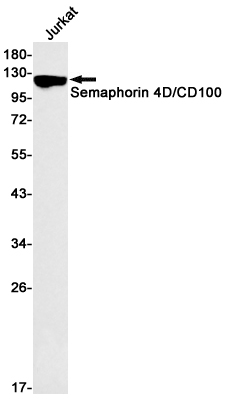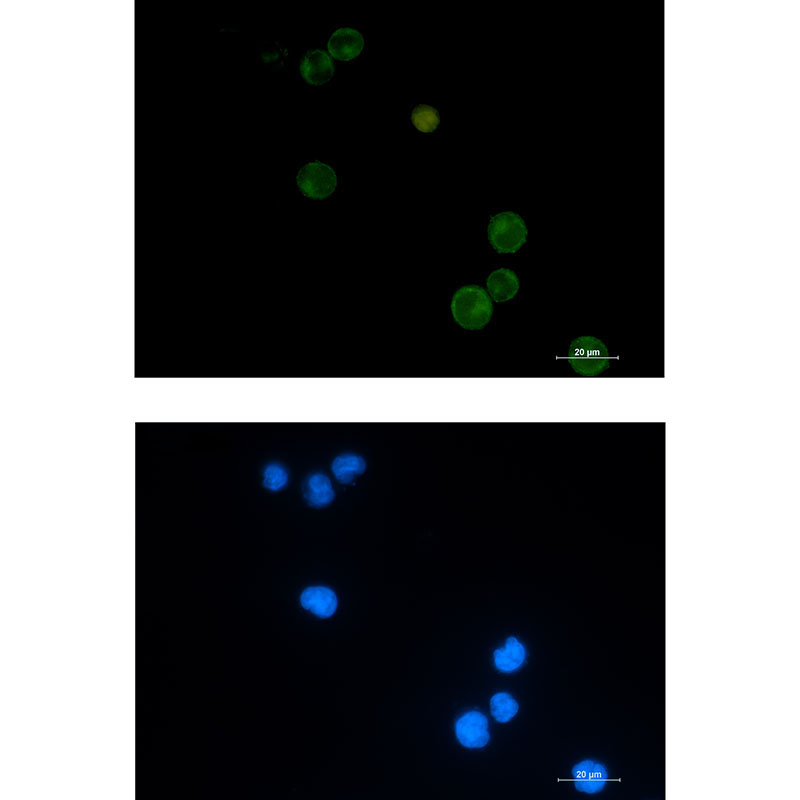

| WB | 1/500-1/1000 | Human,Mouse,Rat |
| IF | 咨询技术 | Human,Mouse,Rat |
| IHC | 咨询技术 | Human,Mouse,Rat |
| ICC | 1/50-1/200 | Human,Mouse,Rat |
| FCM | 咨询技术 | Human,Mouse,Rat |
| Elisa | 咨询技术 | Human,Mouse,Rat |
| Aliases | CD100; COLL4; SEMAJ; coll-4; C9orf164; M-sema-G |
| Entrez GeneID | 10507 |
| WB Predicted band size | Calculated MW: 96 kDa; Observed MW: 120 kDa |
| Host/Isotype | Rabbit IgG |
| Antibody Type | Primary antibody |
| Storage | Store at 4°C short term. Aliquot and store at -20°C long term. Avoid freeze/thaw cycles. |
| Species Reactivity | Human |
| Immunogen | A synthetic peptide of human Semaphorin 4D |
| Formulation | Purified antibody in TBS with 0.05% sodium azide,0.05%BSA and 50% glycerol. |
+ +
以下是关于Semaphorin 4D抗体的3篇代表性文献及其摘要概括:
---
1. **文献名称**:*"Preclinical evaluation of anti-SEMA4D antibody VX15/2503 as a novel immunotherapeutic agent in tumor models"*
**作者**:L.J. Appleman, 等
**摘要**:该研究评估了抗SEMA4D抗体VX15/2503在多种肿瘤模型中的作用,发现其通过阻断SEMA4D与受体Plexin-B1的相互作用,抑制肿瘤血管生成并增强T细胞浸润,显著延缓肿瘤生长。
2. **文献名称**:*"Blockade of SEMA4D enhances immune infiltration and response to anti-PD-1 therapy in tumors"*
**作者**:W. Pan, 等
**摘要**:研究发现SEMA4D抗体可通过破坏肿瘤微环境中免疫抑制屏障,促进CD8+ T细胞浸润,并与PD-1抑制剂产生协同抗肿瘤效应,为联合免疫治疗提供实验依据。
3. **文献名称**:*"Anti-SEMA4D antibody ameliorates neuroinflammation in a murine model of multiple sclerosis"*
**作者**:P.K. Caughman, 等
**摘要**:该文献报道抗SEMA4D抗体在实验性自身免疫性脑脊髓炎(EAE)模型中减轻神经炎症和脱髓鞘的作用,提示其治疗多发性硬化等神经炎症疾病的潜力。
---
以上文献涵盖肿瘤免疫治疗、联合疗法及神经疾病领域,反映SEMA4D抗体的多功能性。如需具体期刊信息或发表年份,可进一步补充检索关键词(如药物名称VX15/2503或疾病模型)。
Semaphorin 4D (SEMA4D), also known as CD100. is a transmembrane glycoprotein belonging to the semaphorin family, initially identified for its role in axon guidance and neuronal development. It interacts with receptors such as Plexin-B1 and CD72. modulating immune responses, angiogenesis, and tumor progression. In the tumor microenvironment, SEMA4D promotes immunosuppression by inhibiting immune cell infiltration and fostering regulatory T cell (Treg) activity. Its overexpression in various cancers correlates with metastasis, poor prognosis, and resistance to therapies.
SEMA4D-targeting antibodies are designed to block these pathological interactions. By neutralizing SEMA4D, these antibodies aim to disrupt downstream signaling pathways (e.g., RhoA/ROCK), thereby reducing tumor invasiveness, normalizing vasculature, and enhancing antitumor immunity. Preclinical studies demonstrate that SEMA4D inhibition enhances T-cell infiltration, suppresses Tregs, and synergizes with checkpoint inhibitors.
Clinical development of anti-SEMA4D antibodies, such as VX15/2503. has shown promise in early trials for solid tumors and neurological disorders like multiple sclerosis. Additionally, their role in mitigating inflammatory conditions (e.g., rheumatoid arthritis) is under exploration. These antibodies represent a dual therapeutic strategy—targeting both tumor progression and immune evasion—while offering potential in diverse pathologies driven by SEMA4D-mediated signaling. Ongoing research focuses on optimizing efficacy and identifying predictive biomarkers for patient stratification.
×